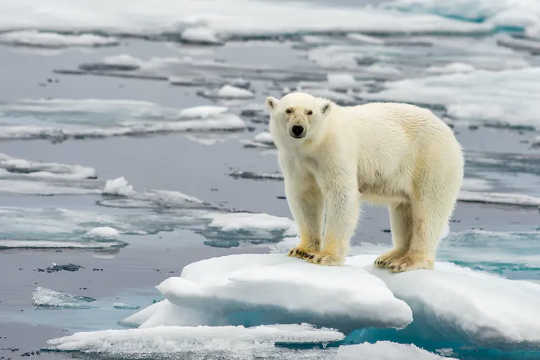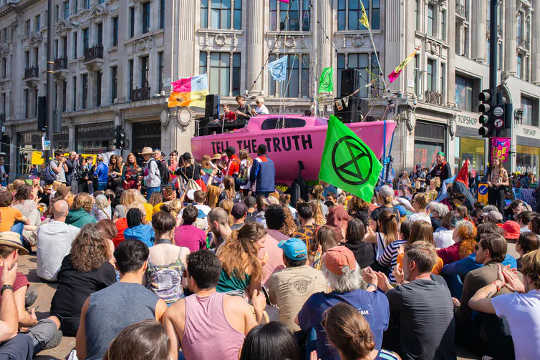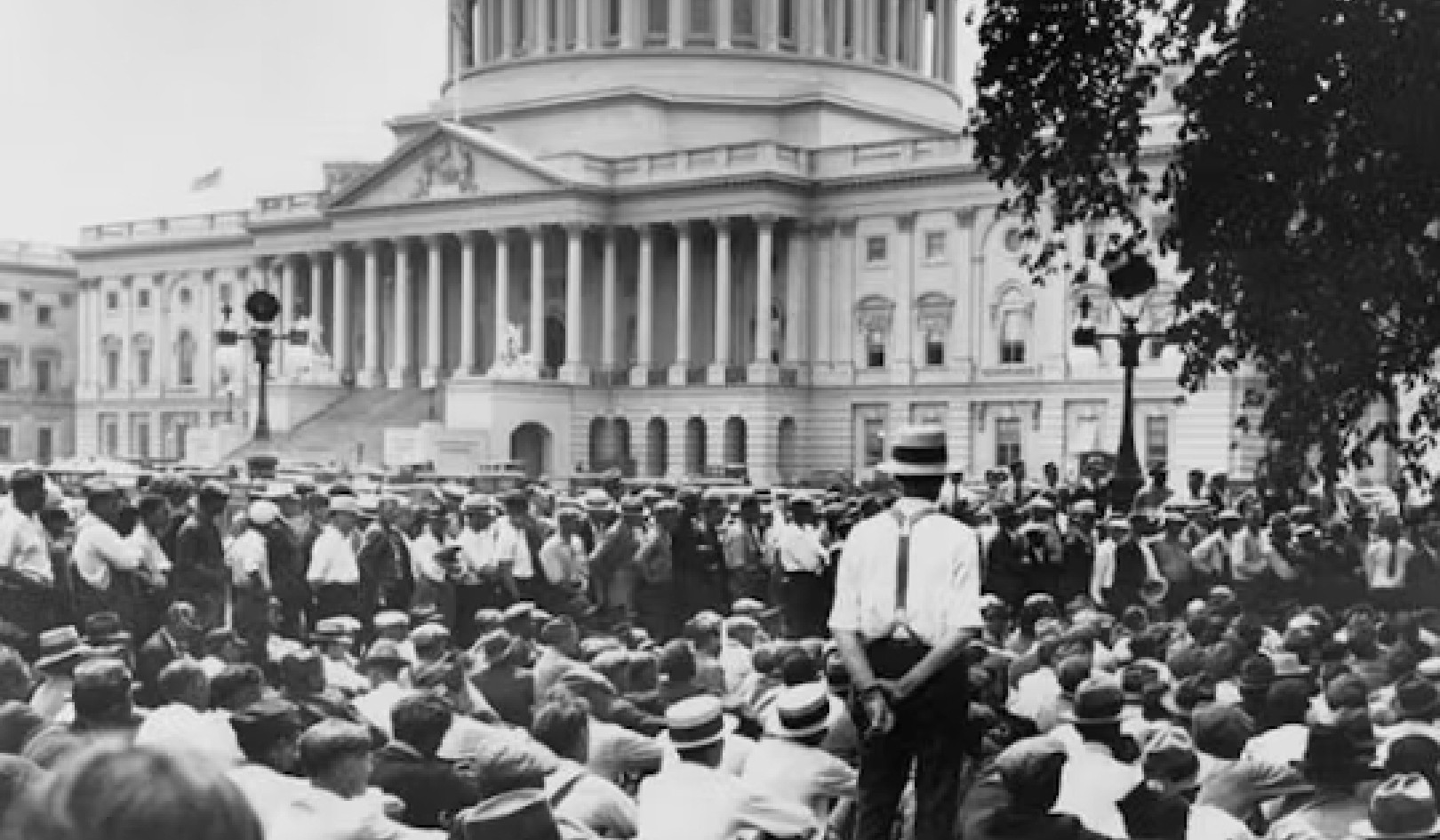For years, scientists have been stressing the need to act quickly and effectively on climate change. And as part of my work as a media psychology academic, I’ve seen the way media outlets along with readers have discussed climate change over the past decade.
I’ve observed very slow progress on the issue. But many news outlets now do present the climate crisis as fact rather than a matter of belief. Though given the scale of the problem, this feels like too little too late. This is why I, along many other academics and psychologists, have joined the environmental campaign group Extinction Rebellion (XR).
This group of activists have long advocated for the need to put in place policies and regulations aimed at addressing the climate emergency and breakdown. Extinction Rebellion poses three demands:
- Tell the truth
- Net zero emissions by 2025
- Organise Citizen Assemblies whose decisions are binding
Extinction Rebellion repeatedly claim that government and media alike are not telling the truth about the gravity and seriousness of the climate crisis. This has led to a series of recent demonstrations against mainstream media outlets calling on them to highlight the crisis and to increase their coverage of climate issues.
So just how much of an issue is press coverage of the climate crisis and are journalists going far enough in their reporting?
False balance and distortions
Back in 2007, researchers from Oxford University highlighted the barriers to accurate and consistent coverage of the climate crisis.
One of the key messages of their report was that sometimes coverage is poor not because of an intentional distortion by the media, but because of a clash between journalistic values and the need to tell the truth about the climate crisis.
Providing a balanced view is an important aspect of reporting and is highly valued by journalists. But research has found that so-called “false balance”, whereby a counter argument or expert is given on a topic where there is otherwise overwhelming consensus, can distort the public’s perceptions of what ought to be noncontroversial subjects.
The way the news is often framed (for example, whether a natural disaster is presented as an isolated incident or in the context of a large-scale phenomenon) can also lead to distortions. So can the types of images associated to climate change news – such as the iconic polar bears, or the melting ice. These images can make it seem like this is something happening far away that won’t impact most people’s lives.
Beyond consensus
I’ve spoken with Extinction Rebellion critics who argue that modern coverage of climate change no longer questions consensus. Indeed, research has found that more recently, the media does generally recognise the existence of consensus in the scientific community – and that critics of climate crisis are in a small minority.
 One of the classic climate change images. FloridaStock/Shutterstock
One of the classic climate change images. FloridaStock/Shutterstock
But the study also shows how distortions still occur in the way journalists frame and interpret climate change issues and expert opinions around it. These results support previous research that analysed climate crisis coverage in British newspapers between 2007–2011. It found that uncontested sceptical voices - though in clear decline - were still present. This practice was predominant in editorials and opinion pieces in right-leaning newspapers often written by non specialist, in-house columnists.
In other words, although the mainstream media has corrected its representation of scientific consensus, a sceptic view is still delivered to readers – just via opinion pieces or editorial rather than news reporting.
This can also be seen in the BBC’s recent response to a complaint concerning the way Justin Webb, presenter of Radio 4’s Today programme, described the climate and ecological emergency as “a matter of opinion”. The complaint office responded by saying that while there is agreement on the reality and existence of man-made climate change, the “notion of there being a climate emergency is the subject of some debate”.
“The notion of there being a climate emergency is the subject of some debate” WTAF @BBCNews @BBCr4today??? The UN says so, the government says so, more than 13,000 scientists say so,even David Attenborough says so.This is CRIMINAL misreporting. Read this: https://t.co/3s5byNRhki pic.twitter.com/1EXFSuk8Tu
— Dr Emily Grossman (@DrEmilyGrossman) September 14, 2020
This is despite the fact that the UK Parliament has declared a climate emergency in response to accumulating evidence on the need to act urgently to save our planet.
Similarly, Rupert Murdoch’s Newscorp papers were promoting a sceptic reading of the devastating 2019 wildfires in Australia.
Outdated views
Research on journalistic norms shows how, by and large, journalists see their role as “informing the citizenry, free from influences of government or obligations to any external force”.
But in the upcoming book, The Psychology of Journalism, that I’ve edited with my colleague Peter Bull, we explore how demands posed by the political and economic system journalists work in can affect the way in which news information is presented. And this can also influence the way people receive and respond to news.
Ultimately though, journalists can still be hesitant to adopt a “doom and gloom” approach when talking about the climate emergency. But research shows this is not the only way to talk about climate crisis – and continuing to present it as a topic to be debated is outdated and dangerous.![]()
About the Author
Sharon Coen, Senior Lecturer in Media Psychology, University of Salford
This article is republished from The Conversation under a Creative Commons license. Read the original article.
Related Books
Life After Carbon: The Next Global Transformation of Cities
by Peter Plastrik , John Cleveland The future of our cities is not what it used to be. The modern-city model that took hold globally in the twentieth century has outlived its usefulness. It cannot solve the problems it helped to create—especially global warming. Fortunately, a new model for urban development is emerging in cities to aggressively tackle the realities of climate change. It transforms the way cities design and use physical space, generate economic wealth, consume and dispose of resources, exploit and sustain the natural ecosystems, and prepare for the future. Available On Amazon
The future of our cities is not what it used to be. The modern-city model that took hold globally in the twentieth century has outlived its usefulness. It cannot solve the problems it helped to create—especially global warming. Fortunately, a new model for urban development is emerging in cities to aggressively tackle the realities of climate change. It transforms the way cities design and use physical space, generate economic wealth, consume and dispose of resources, exploit and sustain the natural ecosystems, and prepare for the future. Available On Amazon
The Sixth Extinction: An Unnatural History
by Elizabeth Kolbert Over the last half-billion years, there have been Five mass extinctions, when the diversity of life on earth suddenly and dramatically contracted. Scientists around the world are currently monitoring the sixth extinction, predicted to be the most devastating extinction event since the asteroid impact that wiped out the dinosaurs. This time around, the cataclysm is us. In prose that is at once frank, entertaining, and deeply informed, New Yorker writer Elizabeth Kolbert tells us why and how human beings have altered life on the planet in a way no species has before. Interweaving research in half a dozen disciplines, descriptions of the fascinating species that have already been lost, and the history of extinction as a concept, Kolbert provides a moving and comprehensive account of the disappearances occurring before our very eyes. She shows that the sixth extinction is likely to be mankind's most lasting legacy, compelling us to rethink the fundamental question of what it means to be human. Available On Amazon
Over the last half-billion years, there have been Five mass extinctions, when the diversity of life on earth suddenly and dramatically contracted. Scientists around the world are currently monitoring the sixth extinction, predicted to be the most devastating extinction event since the asteroid impact that wiped out the dinosaurs. This time around, the cataclysm is us. In prose that is at once frank, entertaining, and deeply informed, New Yorker writer Elizabeth Kolbert tells us why and how human beings have altered life on the planet in a way no species has before. Interweaving research in half a dozen disciplines, descriptions of the fascinating species that have already been lost, and the history of extinction as a concept, Kolbert provides a moving and comprehensive account of the disappearances occurring before our very eyes. She shows that the sixth extinction is likely to be mankind's most lasting legacy, compelling us to rethink the fundamental question of what it means to be human. Available On Amazon
Climate Wars: The Fight for Survival as the World Overheats
by Gwynne Dyer Waves of climate refugees. Dozens of failed states. All-out war. From one of the world’s great geopolitical analysts comes a terrifying glimpse of the strategic realities of the near future, when climate change drives the world’s powers towards the cut-throat politics of survival. Prescient and unflinching, Climate Wars will be one of the most important books of the coming years. Read it and find out what we’re heading for. Available On Amazon
Waves of climate refugees. Dozens of failed states. All-out war. From one of the world’s great geopolitical analysts comes a terrifying glimpse of the strategic realities of the near future, when climate change drives the world’s powers towards the cut-throat politics of survival. Prescient and unflinching, Climate Wars will be one of the most important books of the coming years. Read it and find out what we’re heading for. Available On Amazon
From The Publisher:
Purchases on Amazon go to defray the cost of bringing you InnerSelf.comelf.com, MightyNatural.com, and ClimateImpactNews.com at no cost and without advertisers that track your browsing habits. Even if you click on a link but don't buy these selected products, anything else you buy in that same visit on Amazon pays us a small commission. There is no additional cost to you, so please contribute to the effort. You can also use this link to use to Amazon at any time so you can help support our efforts.
























